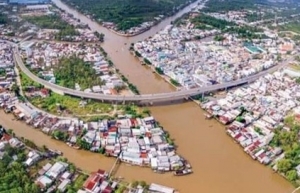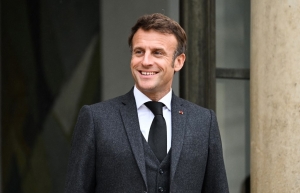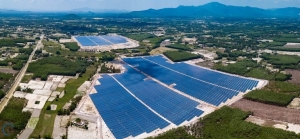French businesses extend reach in green schemes in Vietnam
Could you outline the interest of French companies to promote sustainable development in Vietnam?
Sustainable development is a global concern for many French companies in Vietnam. The awareness of head offices in European/American countries, where corporate social responsibility is increasingly at the centre of business strategy, is tightly tied to corporate success and even measured with key performance indicators.
 |
| Adam Koulaksezian, executive director of the French Chamber of Commerce and Industry in Vietnam |
Meanwhile, environment is now a main concern for Vietnam with its 2050 net-zero strategy outlined, thus accelerating momentum towards the sustainable development.
It is inspiring to have successful initiatives of local associations and small- and medium-sized enterprises (SMEs) which manage to promote sustainable initiatives without any governmental help.
Our sustainable development committee responds to a demand of members to share best practices. It gathers about 30 of our corporate members, both SMEs and large corporations, that are sensitive to sustainable development.
What are the likely fields that French companies want to get involved in across Vietnam?
The first field of investment is renewable energy. French companies have a high level of expertise and market penetration wind and solar power. The strong presence of EDF, Air Liquide, Qair, and GreenYellow illustrates this. There are also smaller actors like HYVITY with specific expertise in hydropower.
The second field where French companies have a concrete expertise that they brought to Vietnam is waste management and water treatment – for example, with the presence of Veolia’s water and waste management in Ho Chi Minh City.
However, there is sustainable investment in all fields. We have even seen it with the French companies involved at the Green Economy Forum & Exhibition that took place in Ho Chi Minh City in November. The exhibitors that showcased their green expertise at the French pavilion are in pharmaceutical, banking, agrofood, construction, and finance, in addition to energy and water/waste management.
Which green initiatives have French companies implemented in Vietnam?
Sanofi is an excellent example with its impactful “rice is the new green” initiative, which implemented the first-ever circular biomass energy solution. There are other very relevant examples.
If we categorise the main sustainable development axis, there are four principles. The first main sustainable investment initiative of French companies concerns the protection of the environment. This is the case of Gemalink, a joint venture between Vietnamese group GEMADEPT and CMA Terminals, with its commitment towards the protection of mangroves to compensate the cuttings done to build its new terminal by planting new mangrove trees in the Mekong Delta.
The second axis is the redefinition of the way companies deliver their services or products to tackle ethical and ecological concerns. For instance, various companies are sourcing natural, qualitative ingredients and work closely with farmers to ensure the respect of human resources and adequate remuneration.
They include Les Vergers du Mekong in beverages, jam, and honey producing; Aroha Sourcing in botanical sourcing, and chocolatier Marou.
This high sustainable commitment is present in other sectors as well, such as the clothing industry. Metiseko is a significant example, as the company is dedicated to making ethical and creative high-end clothing.
A third sustainable initiative is to implement a monitoring plan in a corporation’s factory to better track the energy and raw material consumption to reduce waste. This is what Bel Vietnam did in their local factories. Meanwhile, some companies also changed their services and activities to provide a sustainable solution. This is the case of both large companies and SMEs, including Schneider Electric and HRK, which is a company providing sustainable packaging to avoid plastic.
How do you see French companies and investors contributing to Vietnam’s efforts to achieve its net-zero carbon goals?
The commitment is very ambitious, but it gives a direction for the Vietnamese government to support sustainable development.
According to calculations by the Ministry of Planning and Investment and the World Bank, to implement Vietnam’s green growth strategy by 2030 is expected to need about $30 billion. The state budget can meet up to 30 per cent of resources, and it opens up a lot of investment opportunities in potential fields such as agriculture, energy, finance, and more that investors can consider setting up business.
This number shows that there is a great opportunity for sustainable French investments in Vietnam.
What are your recommendations for Vietnam to attract more French funding into sustainable development areas?
The EU-Vietnam Free Trade Agreement (EVFTA) has promoted positive changes for trade, bringing about many opportunities to boost exports of goods and products to and from the EU market. We would recommend working on the tools that are already well in place and keep improving them.
In addition to the rules that regulate trade between Europe and Vietnamese markets, there is an ecological commitment. Chapter 13 of the EVFTA outlines the objective to promote sustainable development, including by fostering social and environmental aspects of trade and investment. This chapter is based on several previously signed international agreements and conventions.
One important thing to note is that the majority of foreign-invested groups in Vietnam are in the manufacturing sector, mainly to serve export to Western markets. To access these markets, the production needs to meet sustainability norms and standards. Therefore, in order to continue to attract French and other foreign funding, Vietnam has to conform to market sustainability conditions in the likes of Europe, North America, and Australia.
While there are some effective tools in place, others are less efficient such as the current process of work permits, which affects the dynamism of business relations between the two countries.
 | Hau Giang, French agency partner to develop climate resilient city The People’s Committee of Hau Giang province had a meeting with a delegation of the French Development Agency (AFD) on July 19 to discuss a project on developing Nga Bay into a green and climate resilient city. |
 | France's Macron seeks German 'solidarity' on energy French President Emmanuel Macron called on Germany Sunday to show European "solidarity" over soaring energy prices, warning that Berlin's multi-billion plan to help its consumers could lead to "distortions". |
 | GreenYellow acquires 49.5MWp solar farm of French IPP Qair in Vietnam GreenYellow Vietnam - a major player in the energy transition - recently acquired the Vietnamese subsidiary of Qair - French independent renewable energy producer refocusing on European, Brazilian, and African geographies - as well as its 70 per cent stake in Binh Dinh solar farm, a 49.5 MWp asset in operation in Binh Dinh province in Vietnam’s central coast. |
What the stars mean:
★ Poor ★ ★ Promising ★★★ Good ★★★★ Very good ★★★★★ Exceptional
Related Contents
Latest News
More News
- MAE names big 10 policy wins in 2025 (February 06, 2026 | 08:00)
- US firms deepen energy engagement with Vietnam (February 05, 2026 | 17:23)
- Vietnam records solid FDI performance in January (February 05, 2026 | 17:11)
- Site clearance work launched for Dung Quat refinery upgrade (February 04, 2026 | 18:06)
- Masan High-Tech Materials reports profit: a view from Nui Phao mine (February 04, 2026 | 16:13)
- Hermes joins Long Thanh cargo terminal development (February 04, 2026 | 15:59)
- SCG enhances production and distribution in Vietnam (February 04, 2026 | 08:00)
- UNIVACCO strengthens Asia expansion with Vietnam facility (February 03, 2026 | 08:00)
- Cai Mep Ha Port project wins approval with $1.95bn investment (February 02, 2026 | 16:17)
- Repositioning Vietnam in Asia’s manufacturing race (February 02, 2026 | 16:00)

 Tag:
Tag:



















 Mobile Version
Mobile Version